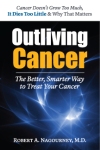Outliving Cancer: Surviving Even the Deadliest Forms of Cancer
March 15, 2013 1 Comment
 My book of the same title (Outliving Cancer, Basic Health 2013) is an exploration of cancer biology through the lens of individual patients.
My book of the same title (Outliving Cancer, Basic Health 2013) is an exploration of cancer biology through the lens of individual patients.
The conceptual framework within which my laboratory operates, reflects the basic premise that cancer doesn’t grow too much it dies too little. Thus, effective cancer therapy (regardless of contemporary wisdom) provides benefit only when the drugs induce cell death. While the forms of cell death may vary from necrotic, to apoptotic, autophagic and others, it is, in the end, the death of the cell that heralds a successful outcome.
We, along with a small group of collaborators, have pioneered the concept of individualized cancer care using each patient’s tumor as the study model. Fresh biopsies exposed to chemotherapies and signal transduction inhibitors, live or die depending upon their relative sensitivity to the drugs in question.
The simple elegance of our platform has provided immense insight into cancer biology, insights we describe in the book, which may ultimately lead to a greater understanding of all human diseases.
Having successfully applied this approach in many diseases, we have published findings in leukemia, breast, ovarian, and most recently, in lung cancers. We are now very excited by observations in one of the most difficult cancers – pancreatic. Ongoing work in this disease will be the subject of upcoming clinical trials.
One patient with pancreatic cancer comes to mind. Steve Lockwood presented to medical attention in the Spring of 2010 with weight loss, abdominal pain, and unrelenting low back pain. He was seen by a local medical oncologist after a CT scan revealed a large mass in the pancreas, extensive liver metastases and disease throughout the abdomen. He then sought the opinion of UCLA and the City of Hope. Neither institution could offer any solutions. Luckily his wife, a nurse, had heard about our work and brought him to Rational Therapeutics.
His tumor markers were doubling every week. He couldn’t eat and required daily intravenous hydration, as well as high dose narcotics to get through each day. He was deteriorating so rapidly that I had concerns that he might be too ill for me to help. We decided to conduct an open liver biopsy. As his tumor markers, CA19.9, climbed into the multiple thousands, we found a three-drug combination to be the most active for his tumor.
Within a week, the pain began to subside. After two weeks, it was demonstrably better. By the time we began treatment cycle two, he had begun to gain weight and came off pain medications entirely.
Two cycles later, his tumor markers were normal and his PET CT remarkably improved. An additional cycle later, his PET CT was normal.
While there are many difficult cancers, metastatic pancreatic cancer figures among the worst. The fact that we could find a treatment was cause for celebration. The fact that Steven now remains in remission, after three years, is nothing short of a miracle. As I have written before, there are two kinds of cancer patients: those we can treat and those we can’t. Steve Lockwood turned out to be one of those patients we could.
Like Niebuhr’s Serenity prayer, oncologists need the serenity to accept the cancers they cannot treat, the courage to treat those that they can, and the wisdom to know the difference. It is our use of laboratory assays to select treatments that provides us with that particular form of wisdom.



Reblogged this on Hope Practiced Here and commented:
Outliving Cancer explores Dr. Nagourney’s journey of scientific discovery. But the story is often told through lens of a patient’s experience. Read today’s blog to find out more about Steve Lockwood, recently interviewed by KTLA 5.